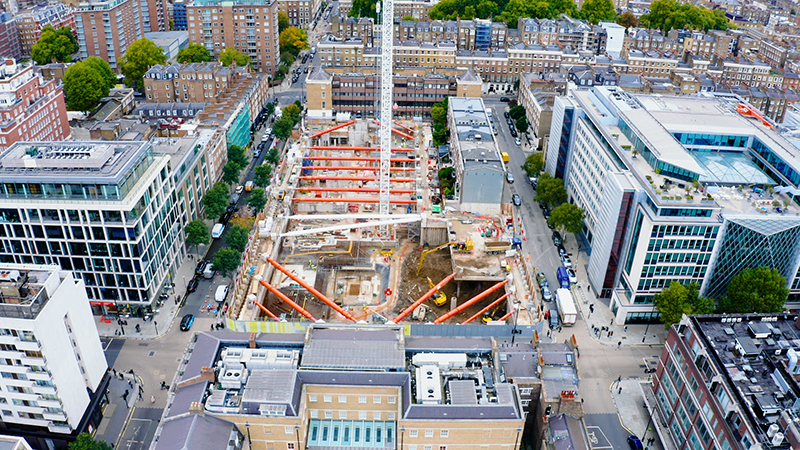
John Breen, UK commercial director at Altrad RMD Kwikform, discusses the growing complexity of basement excavations, and how temporary works can assist construction
BASEMENT excavations are becoming more complex than ever before, especially in inner city areas such as Glasgow where space is at a premium. Contractors are limited to either building up or down, so we are seeing basements getting deeper and site geometry becoming more intricate to accommodate elements such as car parks and plant rooms.
These types of environments also present additional construction challenges including the close proximity to other structures, and the heavy footfall from the public in busy urban areas. With this in mind, what factors do contractors need to consider when undertaking complex basement excavations, and how can temporary works help improve productivity and safety on site?
Key considerations
In the initial stages of planning a basement excavation, contractors need to assess a number of factors. Close proximity to nearby structures can pose greater risks, with the impact of an excavation on neighbouring buildings needing to be thoroughly assessed prior to project commencement.
A site investigation is also important to understand soil conditions, with geotechnical surveys providing data around soil type, water table level, and the presence of any contaminants or obstacles, and well as assessing ground stability and the risk of ground movement or subsidence.
From a health and safety perspective it’s essential to identify potential hazards such as falling objects, confined spaces, and hazardous materials, as well as implementing robust safety protocols and ensuring worker training. Proximity to urban footpaths will also need to be factored in, and safety measures put in place to ensure there is no danger to the public.
Environmental impact will also need to be considered, with noise and vibration control to minimise any detrimental effects on surrounding structures and communities, plus waste management to efficiently dispose of excavated materials.
Propping solutions
Temporary works props provide essential support for basement excavations, enhancing both safety and productivity on-site. Props provide lateral support to the excavation walls, preventing them from collapsing inward – this is crucial in deep excavations where the soil pressure is significant. By stabilising the walls, props help maintain the overall structural integrity of the excavation site, ensuring that the surrounding structures remain unaffected.
Temporary props help distribute the load evenly across the excavation walls, reducing stress concentrations and minimising the risk of structural failures. In cases where an excavation is carried out beneath existing buildings, props can support the load of these structures, preventing settlement or damage.
Props also create a secure environment within the excavation, allowing site teams safe access without the risk of wall collapses, and providing a stable working platform for pouring concrete or installing permanent support structures.
Modern temporary props provide flexibility and adaptability, allowing for quick modifications to suit varying depths and configurations of the excavation. For shorter project durations, hiring reusable props is often a more cost-effective solution than purchasing them or using structural steel.
What’s more, temporary props can be installed quickly, speeding up the construction process and allowing contractors to keep to project timescales. By ensuring stability and safety, props also help minimise delays caused by structural issues or safety concerns, and protect adjacent structures and infrastructure, ensuring that excavation activities do not negatively impact nearby buildings or utilities.
Altrad RMD Kwikform’s range of temporary props provide essential support to waler beams or wall supports to ensure high clearances across the span of a basement. Our basement propping solutions are designed to free span up to 50 metres, with a range of different end connections available to suit all applications.
Used with sheet piles or concrete piles, heavy-duty walers provide maximum support when constructing basements, and heavy-duty props provide optimum horizontal and vertical support for basement construction. Benefits such as fewer components and hydraulic capabilities for pre-loading can help ensure structural props are easy to assemble, move, dismantle, and manage on site.
Collaborative working
When it comes to complex basement excavations, working with a trusted partner that has the skills, equipment, and expertise to advise on bespoke propping design is essential. Value engineering is key to delivering successful solutions, and as driving factors on every contract may differ, communication is crucial to understanding each project’s individual requirements, with specifics incorporated into proposals and designs.
Working together with a temporary works supplier in the initial stages of a project’s construction sequence is essential, with collaboration enabling projects to be delivered safety, effectively, and on time.
Digital tools can help streamline processes, delivering improved collaboration and greater efficiencies by allowing all stakeholders to view 3D visualisations, to interrogate, communicate information, and raise questions about a project. Digital tools can also identify potential clashes and rectify these before equipment is on site.
Technical excellence
Altrad RMD Kwikform provide technical and engineering excellence, to provide customers with the most effective and innovative temporary works solutions for basement excavations. We strive to deliver the most efficient, safe and easy-to-use temporary works solutions for customers, with digital tools to help our customers minimise risks and streamline workflows, enabling greater collaboration across the supply chain.
Our engineers understand the ever-increasing complexity of basement excavation projects, tight timescales, and the need to meet stringent health and safety standards. Once we have supplied materials, trained site demonstrators can be on hand to provide practical guidance on how best to use our equipment in a safe and efficient manner, as well as advising on any design variations required, ensuring a successful outcome.








